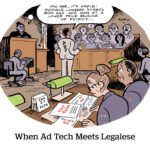What happens when your main monetization partner starts flagging your content as spam?
Just ask Freecycle.
The Freecycle Network is an online community that helps people donate still-usable items to keep refuse out of landfills. Users post listings of the things they want to give away, which makes Freecycle a publisher of sorts.
Although Freecycle is a nonprofit, it relies on advertising for between 30% and 50% of its annual operating budget, and its entire ad business is programmatic, said Deron Beal, Freecycle’s founder and executive director.
The company only has one full-time engineer on staff who handles backend web development as well as overseeing the site’s digital ad business.
Freecycle launched in 2003 as a directory of local Listserv groups, and its website now attracts 10 to 15 million page views per month.
Starting in 2009, Google AdSense became Freecycle’s primary partner for monetizing its traffic, and for years its AdSense revenue was “more than enough to keep [us] going,” Beal said. The AdSense service also essentially ran itself, he added, which freed the company’s lone engineer to focus on running the website.
But around 2016, AdSense began flagging Freecycle for spam and fraud violations at a greater rate than ever before, Beal said.
Freecycle allows anonymous users to post listings for free stuff, which are then promoted via emails that can sometimes get caught up in spam filters. Beal theorizes that a policy change around 2016 made AdSense’s spam filters more sensitive to Freecycle’s operations, although Freecycle was never able to fully determine why its site was being singled out.
Each time Freecycle was flagged as a potential spammer, AdSense would completely demonetize the site.
Head-scratcher
It became clear that relying so heavily on a single monetization partner was a problem.
In 2017, Freecycle turned to header bidding, which was relatively new on the market at the time, to reduce its reliance on AdSense.
However, the company’s one-person engineering team had trouble managing the header-bidding system and the constant stream of Prebid updates on top of web development duties, Beal said. This task can be a challenge for many smaller, independent publishers.
By early 2021, thanks to difficulties monetizing via AdSense and header bidding, Freecycle’s ad revenue had dropped by about 70% compared to its historical averages, according to Beal.
Freecycle had partnered with a handful of tech vendors as it implemented header bidding, but eventually decided that turning its ad business around would require handing over management of the header-bidding system to one of these vendor partners, Beal said.
Managed service
In August 2021, Freecycle ultimately decided to hand over the reins to PubWise, an end-to-end programmatic optimization platform for publishers.
Previously, PubWise had been providing Freecycle with header-bidding analytics and access to Google AdX through the Google Multiple Customer Management (MCM) Program, said PubWise Founder and CTO Stephen Johnston.
Now, PubWise manages Freecycle’s entire programmatic ad business, including header bidding and AdX. Since handing control to PubWise, Freecycle’s ad revenue is up 300%, its CPMs are up 59% and its fill rates are up 23%, Johnston said. PubWise’s cut is 20% of Freecycle’s header-bidding revenue and 10% of its AdX revenue.
PubWise bundles the Prebid configuration into a centralized platform akin to Google Ad Manager, giving publishers a familiar window into campaign performance, Johnston said. PubWise also offers machine-learning-based demand path optimization, and the company’s consultants work with Freecycle and its demand-side partners to zero in on successful ad placements and campaigns, he said.
For Freecycle, the best-performing ads tend to be in the home improvement, home and garden and travel verticals. “The audience is clearly conscious of reuse and reducing landfill volume, and they are more broadly often working on a project at home or around the house,” Johnston said.
With programmatic revenue back on track, Freecycle has tasked PubWise with growing its direct sales business. Johnston and Beal declined to share the current revenue split between direct sales and open-web programmatic.
PubWise is also responsible for insulating Freecycle’s ad business from the signal loss problems plaguing digital advertising. For example, Freecycle has been testing ID solutions including ID5, The Trade Desk’s Unified ID 2.0 and Prebid’s SharedID, as well as contextual targeting solutions like the IAB Tech Lab’s Seller-Defined Audiences.
“Freecycle is very conscious of user experience, so we are focused on enriching the context available to advertisers [rather] than loading on more in-page tech,” Johnston said.
With the responsibility for running the ad business off its plate, Freecycle has been focusing more attention on launching a dedicated mobile app, which has been a company goal for some time, Beal said.
Freecycle plans to replicate its website ad experience in the app, he said, which will create an entirely new revenue stream for the nonprofit.
















